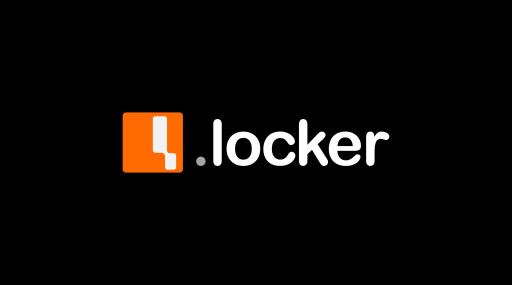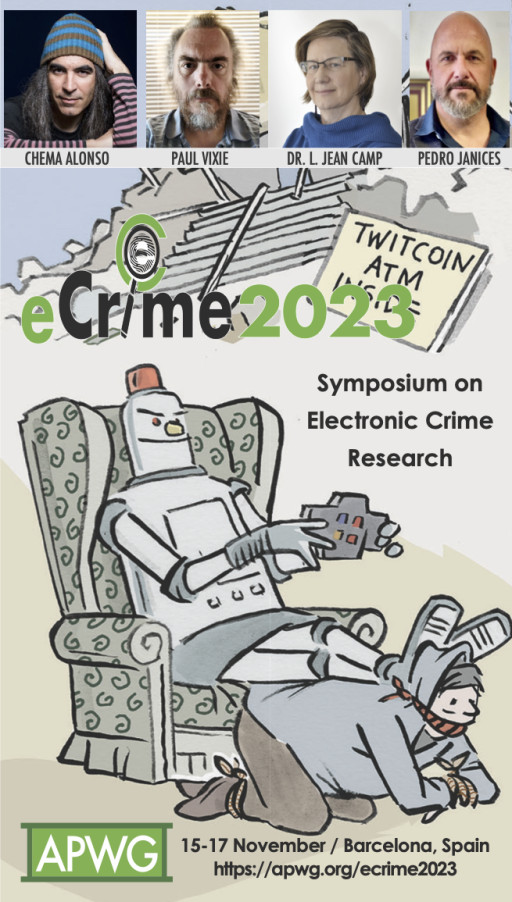 APWG eCrime 2023 APWG eCrime 2023
APWG eCrime 2023 APWG eCrime 2023
CAMBRIDGE, Mass., August 30, 2023 (Newswire.com) - The organizing committee of the 18th annual Symposium on Electronic Crime Research (APWG eCrime 2023) announced today that the conference would extend its deadline for peer-review submissions to Sept. 10, responding to a number of requests from its worldwide community of cybercrime research investigators.
Full details for submitting investigators are here: https://apwg.org/event/ecrime2023.
The 2023 APWG Symposium on Electronic Crime Research (APWG eCrime) in Barcelona (Nov. 15-17) will be receiving the wisdom and insights of industrial titans, industrial and academic researchers, ministers from national governments and multilateral organizations and cyber cops from around the world — as well as the grim, weathered cadre of operations professionals from all industries who are holding the line against the scourge of cybercrime today.
The selected peer-reviewed papers will be included in the symposium's presentations along with numerous panels and talks from other correspondent researchers selected from industrial and academic research centers affiliated with the APWG.
IMPORTANT DATES:
Full Papers registration and submission due: September 10 (anywhere on earth)
Notification of acceptance: October 6
Conference: November 15-17
Camera-ready paper due: December 15
For peer-reviewed paper submissions in 2023, please register an account, then use the "New Submission" option at https://ecrime2023papers.hotcrp.com/.
APWG eCrime 2023 also solicits industrial laboratory research submissions for its General Sessions during the symposium. The deadline for General Session presentation proposals is Oct. 27 and can be submitted to [email protected].
SUBMISSION TOPICS INCLUDE BUT ARE NOT LIMITED TO:
- Artificial Intelligence as criminal co-conspirator - and as defensive collaborator
- Addressing challenges of cybercrime's increasing complexity (e.g. digital infrastructures, crime-fighting/forensic techniques, and the structure of the crimes themselves)
- Detecting and/or mitigating eCrime (e.g. online fraud, malware, phishing, ransomware, etc.)
- Behavioral and psychosocial aspects of cybercrime victimization - and prevention
- Measuring and modeling of cybercrime
- Economics of cybercrime
- Cybercrime payload delivery strategies and countermeasures (e.g. spam, mobile apps, social engineering, etc.)
- Public Policy and Law for cybercrime
- Cryptocurrency and related cybercrimes - and forensic tools and techniques for cryptocurrency-related cybercrimes
- Case studies of current cybercrime attack methods, (e.g. phishing, malware, rogue antivirus programs, pharming, crimeware, botnets, and emerging techniques)
- Detecting/preventing abuse of internet infrastructure to neutralize cybercrimes
- Detecting/isolating cybercrime gangs and attendant money laundering enterprises
- Cybercrime's evolution in specific verticals: (e.g. financial services, e-commerce, health, energy & supplies)
- Cybercriminal cloaking techniques - and counter-cloaking tools and approaches
- Design and evaluation of UI/UXs to neutralize fraud and enhance user security
AUTHORS' GUIDANCE
eCrime has adopted the IEEE publication format. Submissions should be in English, in PDF format with all fonts embedded, and formatted using the IEEE conference template, which can be found at:
http://www.ieee.org/conferences_events/conferences/publishing/templates.html.
Submissions should be anonymized, excluding author names, affiliations and acknowledgments. Authors' own work should be referred to in the third person.
Paper should not exceed 12 letter-sized pages, excluding the bibliography and appendices.
Committee members are not required to read appendices, so ensure that the main paper is intelligible without them.
Submitted papers that do not adhere to all the above guidelines may be rejected without consideration of their merits.
Authors of accepted papers must present them and register at the event.
For paper submissions, use the New Submission option at: https://ecrime2023papers.hotcrp.com/
Authors will be asked to indicate whether they would like their submissions to be considered for the Best Student Paper Award. Any paper co-authored by a full-time student is eligible for this award.
Authors of accepted papers must guarantee that their paper will be presented at the conference. We understand that some authors may face difficulties in obtaining funding to attend the conference. Therefore, a limited number of stipends are available for those who are unable to secure funding. Students who will present their accepted papers themselves will be given priority in receiving such assistance.
Submitted papers risk being rejected without consideration of their merits if they do not follow all the above guidelines.
Submissions must not substantially duplicate work that was published elsewhere, or work that any of the authors has submitted in parallel to any other conference or workshop that has proceedings.
Accepted papers will be submitted for inclusion into IEEE Xplore subject to meeting IEEE Xplore's scope and quality requirements.
NOTE: This year's eCrime program marks 20 years since APWG's founding. Originally organized by a coalition of banks, technology companies and US federal police agencies, investigating the then-new threat of phishing, APWG has evolved into a global coalition of cybercrime experts spanning the globe from a number of industries, research disciplines and public-sector entities, from key nation-states to global multilateral organizations. Contact Information:
Peter Cassidy
Secretary General [email protected]
617-669-1123
Related Images
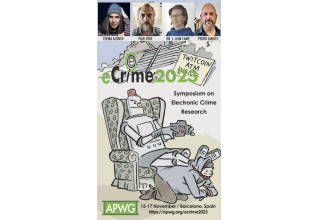 APWG eCrime 2023
APWG eCrime 2023
APWG eCrime 2023
APWG eCrime 2023
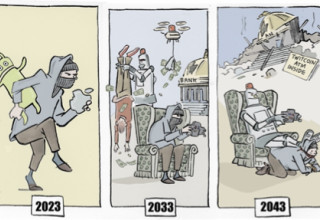 APWG Celebrates 20th Anniversary - Looking Ahead at Cybercrime's Advance
APWG Celebrates 20th Anniversary - Looking Ahead at Cybercrime's Advance
APWG Celebrates 20th Anniversary - Looking Ahead at Cybercrime's Advance
APWG Celebrates 20th Anniversary - Looking Ahead at Cybercrime's Advance
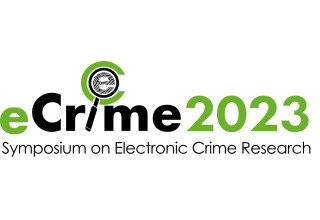 APWG eCrime 2023
APWG eCrime 2023
APWG eCrime 2023
APWG eCrime 2023
 APWG eCrime Symposium Keynoters
APWG eCrime Symposium Keynoters
APWG eCrime Symposium Keynoters
APWG eCrime Symposium Keynoters
Original Source:
APWG 2023 Cybercrime Research Conference Extends Submission Deadline to September 10


